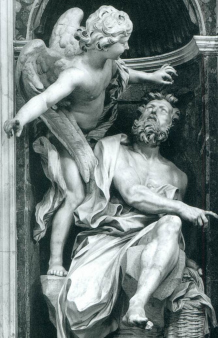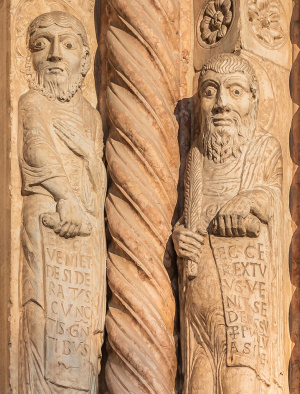The books of this set are considered "minor" since each is much shorter than the writings of "major" prophets Isaiah (sixty-six chapters), Jeremiah (fifty-two chapters), and Ezekiel (forty-eight chapters).
The longest Minor Prophet books are Hosea and Zechariah, with each having fourteen (14) chapters. The shortest prophetic book in this series is Obadiah, with only one chapter, followed by Haggai, which has only two.
The Book of Daniel, although it contains important prophecies from Daniel’s time to the end of the age and Christ’s return, is not included as part of the writings of the Minor Prophets. This is because Daniel wrote in Babylon during the Jews' 70-year exile.
The below timeline, when a range is given, denotes the time period when the prophet likely wrote his book. The text underneath each prophet is a brief description of the themes of their prophecies and to whom they are addressed or affect.

Jonah
798 B.C.
Jonah, the first of the Minor Prophets to have written a book, is a type of Jesus Christ who shows God's mercy to those who repent. He prophetic cry warning the city of its impending doom was due to the city's wickedness (Jonah 1:2). See our outline of Jonah's book!
Hosea
c. 792 to 715
Hosea wrote about salvation and his prophecies were against Israel (Ten Tribes of Israel). He condemned adultery, drunkenness, idolatry and licentiousness.
Amos
c. 762 B.C.
Amos wrote about the prophetic Day of the Lord. His predictions were against Israel, Judah, Benjamin and all nations. He spoke about the oppression of the poor, sexual immorality, wanton luxury and corrupt laws. See our outline of Amos' book!
The book of Amos can be fairly accurately dated based on the book's first verse.
The words of Amos, who was among the herdmen of Tekoa, which he saw concerning Israel in the days of Uzziah king of Judah, and in the days of Jeroboam the son of Joash king of Israel, two years before the earthquake (Amos 1:1, KJV).
The massive earthquake mentioned by the prophet likely took place around 760 B.C. (Amos' Earthquake, International Geology Review). Two years before this event is 762 when King Uzziah (Azariah) ruled over Judah and Jeroboam II reigned over Israel. This earthquake was so powerful that Zechariah reference it in his prophecy of Jesus' Second Coming (Zechariah 14:4 - 5).
Micah
740 to 711
Micah wrote about how the Eternal is a just Judge. His prophetic words were against Samaria, Jerusalem and all nations. He condemned the lack of justice and oppression of the people.
Nahum
662 to 627
Nahum wrote his book after the fall of Thebes (No) in 663 B.C. (Nahum 3:8) but before the city of Nineveh was sacked by its enemies in 612. It is highly likely he wrote before the Assyrian Empire began to decline after the death of King Ashurbanipal in 627.
Nahum wrote about the impending judgment on Nineveh (capital of the Assyrian Empire) and the subsequent comfort to Israel. Nineveh's condemnation was due to their indulging in wickedness as well as their cruel treatment of others.
Zephaniah
640 - 622
Zephaniah, the tenth of the Minor Prophets listed in most Bibles, wrote concerned God's indignation, Israel's repentance and their subsequent saving by the Lord. His inspired prophecies were against Judah and all people. He warned of spiritual fornication and the events surrounding the Day of the Lord.
Habakkuk
626
Habakkuk wrote about how God embraces Judah through destroying the Chaldeans. His prophetic utterings were against Babylon with implications for all people. He cried out against aggression, plunder, greed, graft, idolatry and inhumanity.
Joel
596 to 586
Joel's book mostly concerns the prophetic Day of the Lord which will take place in the End Time. His words were against Israel and all people in general. He condemened adultery, drunkenness, idolatry and licentiousness. See our outline of Joel's book!
Obadiah
590
The central theme of Obadiah is God's condemnation of Edom and its destruction. The prophet also spoke about the future restoration of Jacob's (Israel's) fortunes through receiving their full inheritance in the Promised Land.
Haggai
520
Haggai's task was to motivate the freed Jewish captives in Judah to repent and to also restart the rebuilding of Jerusalem's temple. His also wrote to encourage Zerubbabel, Judah's govenor, in his overseeing of the project. See our outline of Haggai's writing!

Zechariah
520 to 518
Zechariah was inspired to record that the coming of God's Kingdom will be preceded by the building of the Temple. His prophecies concerned Zerubbabel and Joshua the High Priest. He also spoke about the symbolic nature of Joshua's filthy garments and the people's lack of judgment, mercy and peace.
Malachi
c. 400
Malachi, the last of the Minor Prophets, wrote about being prepared for the Messenger (John the Baptist) that is to come. His messages was primarily directed toward Israel and the 'Israel of God' today (the church).
The prophet spoke against the priests neglecting their duties, as well as chiding the people for practicing divorce, adultery, and robbing God of tithes. See our outline, along with questions and answers, on this fascinating book!